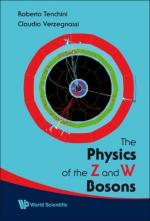|
This section contains 135 words (approx. 1 page at 300 words per page) |
W mesons, or W bosons, are heavy charged particles that mediate the weak nuclear interaction. In standard high-energy units, they have a mass of 81 GeV. There are two varieties, the W+ with charge +e, and its antiparticle, the W- , with charge -e. The W bosons are some of the heaviest elementary particles, with a mass comparable to that of a krypton nucleus. They have a very short lifetime on order of 10-27 seconds, which requires that they be detected by looking for specific decay signatures in particle detectors. They were predicted to exist in the late 1960s and early 1970s by the unified electroweak theory, and were eventually detected in the mid-1980s at the large electron positron collider, LEP, at the European Center for Nuclear Research (CERN) near Geneva, Switzerland.
|
This section contains 135 words (approx. 1 page at 300 words per page) |


